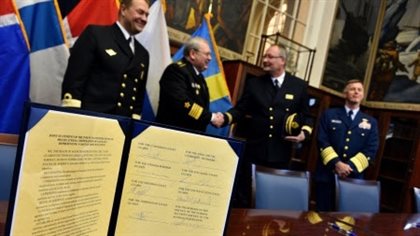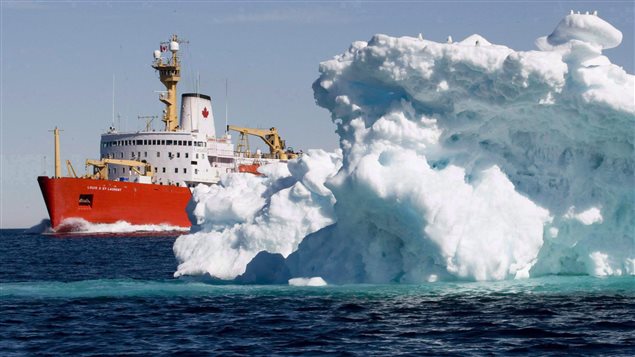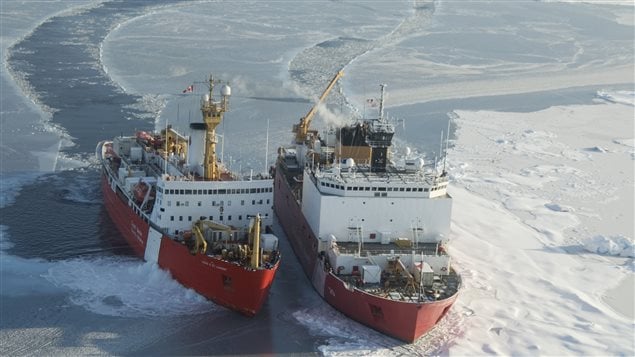
Representatives all eight circumpolar nations signed a historic deal on Friday committing their coast guards to cooperate and coordinate their work in the treacherous but increasingly accessible Arctic Ocean.
The two-day Arctic Coast Guard Forum (ACGF) Experts Meeting took place at the U.S. Coast Guard Academy in New London, Connecticut. It brought together experts from Canada, Denmark, Finland, Iceland, Norway, Sweden, the United States and Russia.
“It means increased collaboration, increased information sharing among all eight Arctic Council nations,” said U.S. Coast Guard Commandant Adm. Paul Zukunft in a phone interview with Radio Canada International. “Many of us do exercises, we learn lessons from them, and many of us do very similar exercises and sometimes we all make the same mistakes, so it’s an opportunity to learn from others.”
ListenAdm. Zukunft said the ACGF provides an opportunity to take a comprehensive look at marine environmental protection, increased human activity, cruiseshipping and oil industry.
Adm. Zukunft said the impetus for creating the ACGF grew out of the concerns of Arctic Council member countries over the increasing need to ensure safety, security, and stewardship of Arctic waters.
“The Forum was envisioned to provide an opportunity for coast guards with an Arctic area of responsibility to focus on and advance operational issues of common interest in the Arctic, such as search and rescue, emergency response, and icebreaking, to facilitate multi-level collaboration between coast guards and to support the work of the Arctic Council,” said Carole Saindon of the Department of Fisheries and Oceans, which runs the Canadian Coast Guard. “The heads of the eight coast guard agencies, including Canada, have agreed that collaboration on such operational matters is to everyone’s benefit.”
A meeting place
In most countries, coast guards are a branch of the military. That means the new forum will also provide a meeting place for high-ranking military officials from member countries, say experts.

“The most important consequence of the meeting will be that from now on there will be regular contact, regular meetings and exercises between the coast guards of all eight Arctic countries, and most importantly between Russia and Arctic NATO countries,” said Michael Byers, a professor of political science at the University of British Columbia. “It’s very important that they’d be able to speak with each other to build confidence, to cooperate, especially given the tensions between Russia and NATO elsewhere in the world.”
Building on existing ties
Byers said there is a strong understanding in Washington and Moscow that the two countries need venues for diplomatic and security cooperation, and the Arctic where the two superpowers already cooperate is an ideal place to build this cooperative relationship.
“In December 2014, a South Korean trawler sank on the Russian side of the Bering Sea and the first thing the Russians did was to call the U.S. Coast Guard,” Byers said.
The Coast Guard Forum will exist in parallel with the 2011 treaty on Arctic search and rescue, negotiated through the Arctic Council. That treaty committed signatories to providing search and rescue in their sector of the North.
“This new forum will supplement existing cooperation, provide more regular contact between the leaderships of the different Arctic coast guards but it’s being built on top of already strong foundation,” Byers said.
Adm. Zukunft said, one of the forum’s first actions was to run a tabletop exercise to simulate a mass rescue operation involving a cruiseship in Arctic waters. That exercise helped establish communications protocols and determine who responds to what.
“We will meet again in about six months, the United States will host the next meeting,” said Adm. Zukunft, “normally these meetings are held on an annual basis but we recognize that we have a great momentum on this initial meeting of the principals and we really want to pick up the speed if you will, to put some of these ideas, these thought into practice.”
The forum, although it will involve military personnel, will steer clear of security issues. That will follow the lead of other coast guard forums that already exist, such as those for the North Atlantic and North Pacific.
The forum is separate from the Arctic Council, the chief international diplomatic body on northern issues. However, its leadership will rotate in concert with the council, which is now led by the U.S.
With files from The Canadian Press







For reasons beyond our control, and for an undetermined period of time, our comment section is now closed. However, our social networks remain open to your contributions.